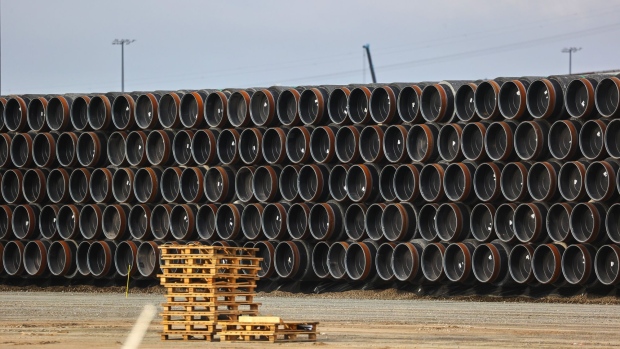Dec 11, 2020
German Lawmakers Weigh Sanction-Proof Structure on Nord Stream 2
, Bloomberg News

(Bloomberg) -- Germany is looking at a legal mechanism that would help protect Russia’s controversial Nord Stream 2 natural gas pipeline from U.S. sanctions.
With work on the link due to resume off Germany’s Baltic coast, senior lawmakers in Berlin are discussing the creation of a state-owned foundation that could shield Nord Stream 2’s assets.
Germany must prepare for a “hard confrontation” to defend its interests in the project that will increase gas supplies from Russia, said Rolf Muetzenich, the co-ruling Social Democrats chief whip in parliament. He backs a proposal by the provincial government of Mecklenburg-West Pomerania -- Chancellor Angela Merkel’s home district and the place where Nord Stream 2 lands -- to create new legal protections.
The move if it progresses would represent the German government’s most rigorous defense yet of the 9.5 billion-euro ($11.2 billion) project. Work halted a year ago after the President Donald Trump imposed sanctions on companies working on the link, and the Congress in Washington is poised to approve new penalties as soon as this week.
The U.S. asserts the 1,239-kilometer (770-mile) pipeline gives Russia too much leverage over Europe and potentially deprives U.S. liquefied natural gas suppliers of markets. Russia’s gas export company, Gazprom PJSC, has quietly been working on ways to restart work despite sanctions.
The provincial government where the pipeline will end in Germany proposed a state-protected legal entity that would hold assets inside of a foundation, ostensibly operating under a philanthropic purpose to protect the environment, according to a Nov. 23 regional cabinet proposal seen by Bloomberg. The German-language name of the proposed foundation is the “Stiftung Klimaschutz MV.”
The government of Mecklenburg-West Pomerania needs to move “urgently” toward legal protections that ward off pending U.S. sanctions, according to the document. Mecklenburg-West Pomerania’s finance and energy ministries both declined to comment on the proposal.
Foundations and trusts can be set up in Germany with a philanthropic purpose and entail a transfer of private assets to a entities that are regulated separately under the law, according to the country’s Foundations Federation website.
The move is “impressive and right” and needed to “defend our sovereignty and our interests,” said Muetzenich.
“On the face of it, it seems to be a smart move,” but the “devil will be in the detail,” said Claudia Mueller, a lawmaker from the opposition Greens who represents Mecklenburg-West Pomerania in federal parliament. She’s skeptical that “a foundation with a commercial purpose can fulfill the remit of public philanthropic institution,” she said Thursday by phone.
As the regional parliament in Schwerin is shuttering this week for the seasonal break, Mueller said she expected no decision on the proposal before January.
©2020 Bloomberg L.P.


